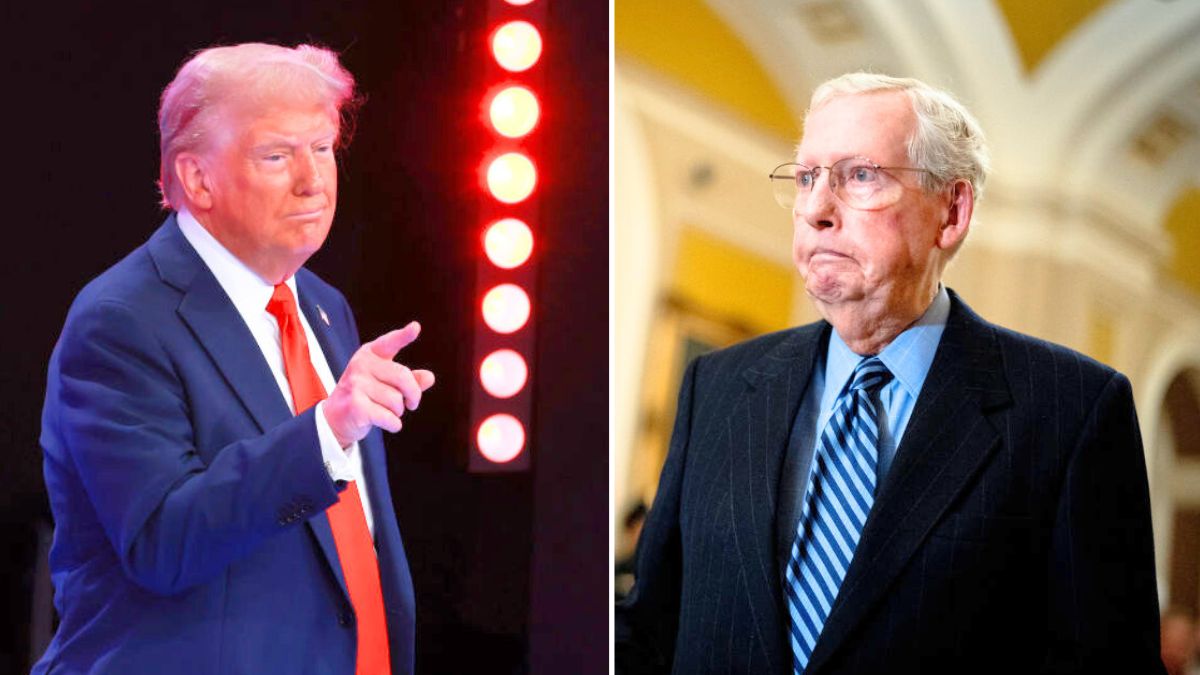‘Will not be made great again’: Controversial GOP figurehead allegedly lashes out at Trump

Somehow situating himself as a bulwark of authority and sanity, Senate Republican Leader Mitch McConnell recently launched a thinly veiled critique of President-elect Donald Trump’s foreign policy vision Saturday, invoking Ronald Reagan’s legacy to warn against isolationist tendencies within the Republican Party.
Speaking at the Reagan National Defense Forum, McConnell pointedly declared that “America will not be made great again by those who are content to manage our decline”—an apparent reference to Trump’s signature slogan, which itself was liberally stolen from Reagan’s 1980 campaign.
The Kentucky senator’s speech, which earned a standing ovation per Politico, centered on Reagan’s “peace through strength” doctrine, particularly regarding NATO alliances that Trump has repeatedly questioned. Just one day after McConnell’s remarks, Trump told NBC’s Meet the Press he would consider withdrawing from NATO if member nations weren’t “paying their bills,” whatever this means.
This dramatic split between the Senate Republican leader and the incoming president highlights deepening fissures over American foreign policy. While McConnell championed robust international alliances and military readiness, Trump has called for an immediate ceasefire in Ukraine and expressed openness to reducing military aid, which would absolutely harm the Eastern European country’s ability to defend itself against Putin’s unending onslaught.
European leaders appear to be preparing contingency plans. German opposition leader Friedrich Merz proposed creating a contact group of European allies—including France, Britain, and Poland—to coordinate Ukraine policy independently of Washington. Ukrainian President Volodymyr Zelenskyy quickly endorsed the idea during Merz’s visit to Kyiv.
Trump’s recent statements have done little to counter concerns about his relationship with Vladimir Putin. When asked directly if he had spoken with the Russian leader since winning the election, Trump notably refused to answer, saying, “I don’t want to say anything about that.” In a social media post pushing for an immediate ceasefire, Trump wrote, “I know Vladimir well. This is his time to act.” Combined with his openness to reducing Ukraine aid and potentially withdrawing from NATO—two outcomes that would significantly benefit Russia’s strategic interests—Trump’s post-election positioning aligns, ahem, remarkably well with Moscow’s broad (ironically) expansionist objectives in Eastern Europe. To say Trump’s relationship with Putin, let’s say, irregular would be an understatement.
However, former NATO Deputy Assistant Secretary General Jamie Shea cautioned that the alliance is unlikely to directly counter U.S. positions. “I don’t think NATO will try to act counter to the United States or the Trump administration,” Shea said. “It obviously would do no good for Trump’s attitude towards the Europeans or NATO in general.”
As a point of note, however, the debate over “peace through strength” itself carries historical weight. Critics like scholar Andrew Bacevich have warned that the doctrine can transform into “peace through war.” Yet McConnell positioned himself as the guardian of Reagan’s strategic vision, implicitly suggesting Trump’s approach represents a dangerous departure from conservative foreign policy traditions.
By framing his critique through Reagan’s legacy, McConnell delivered a sophisticated rebuke of Trump’s foreign policy without naming him directly, even managing to position himself amongst the “adults” in the room’ that will have to manage the President-elect as if he were a wild teenager. The speech signaled that despite Trump’s electoral victory and his instant desire to kick the tires on certain institutions, significant resistance to his international agenda persists within Republican leadership—particularly regarding NATO commitments and support for Ukraine.
All of this being said, if McConnell wanted Trump to have several seats to the left, he had two opportunities to do so via the impeachment process. Both times, he declined. So, one should take the speech for what it is: A hand-slapping of Trump’s reach onto the hot stove.
Have a tip we should know? tips@themarysue.com